
Abstract: What kinds of scientific computing problems are suited to be solved on a quantum device with quantum advantage? It turns out that by transforming a partial differential equation (PDE) into a higher-dimensional space, it can be transformed into a system of Schrodinger’s equations, which is the natural dynamics of quantum devices. This new method – called Schrodingerisation – thus allows one to simulate any general linear partial differential equation via quantum simulation.
Schrodingerisation can also be applied to problems in linear algebra by transforming iterative methods in linear algebra into evolution of ordinary differential equations, like the Jacobi method and the power method. This allows us to directly use quantum simulation to solve the linear system of equations and find maximum eigenvectors and eigenvalues of a given matrix.
This method can be adapted to also solve boundary value problems like quantum dynamics with artificial boundary conditions.
I’ll also explore ways in which quantum algorithms can be used to efficiently solve not just linear PDEs but also certain classes of nonlinear PDEs, like nonlinear Hamilton-Jacobi equations and scalar hyperbolic equations, which are useful in many areas like optimal control and machine learning. PDEs with uncertainties can also be tackled more efficiently with quantum algorithms.
Bio: Nana Liu is an associate professor and PI of the Quantum Information and Technologies (QIT) group in the Institute of Natural Sciences at Shanghai Jiao Tong University and the University of Michigan-Shanghai Jiao Tong University Joint Institute. She received her PhD from the University of Oxford as a Clarendon Scholar in 2016. She is the 2019 recipient of the MIT Technology Review’s 10 Innovators under 35 in the Asia-Pacific region. Her research focus is on employing quantum resources for quantum computation, with a current focus on quantum algorithms for ordinary and partial differential equations. Her research also lies at the interface between quantum computation, security and machine learning.
